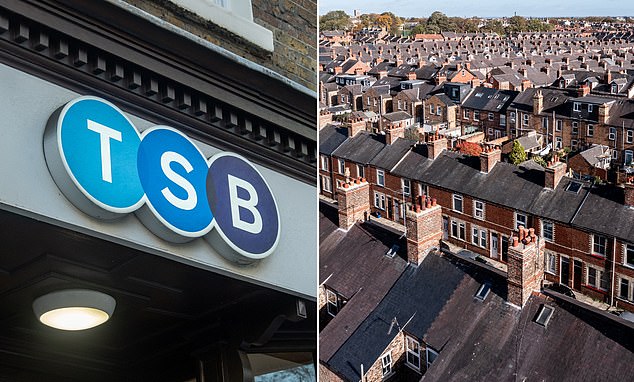Table of Contents
TSB is offering its mortgage customers the chance to fix their deal for just one year.
Starting tomorrow, the bank will offer the one-year solution to existing mortgage customers who want to refinance into a new deal in what is known as a product transfer.
The one-year fix will be available at a rate of 5.95 per cent, meaning someone taking out this deal with a £200,000 mortgage will pay £1,282 a month, based on a 25-year repayment term.
TSB’s new product differs from the norm, as most fixed mortgages have a duration of two, three, five or even ten years.
Short term solution? TSB has launched a one-year fixed rate mortgage offer for existing customers who want to transfer the product, with a rate of 5.95%
However, TSB is not the only one offering borrowers the chance to fix for a year.
Precise Mortgages is currently offering a no-fee one-year fixed rate deal at 5.69 per cent for mortgages covering up to 75 per cent of a property’s value.
Kensington Mortgages also has a one-year fix of 6.04 per cent for a loan-to-value ratio of up to 75 per cent, with a fee of £999.
Why take out a one-year fixed mortgage?
There is no denying that rates are much higher with these one-year fixed rates.
The lowest five-year fixed rate for someone who needs a mortgage covering 75 per cent of a property’s value is currently 3.85 per cent.
On a £200,000 mortgage repaid over 25 years, that would equate to £1,039 a month – around £243 less each month than someone opting for the one-year deal with TSB.
Meanwhile, the lowest fixing in two years is 4.04 percent. That would equate to £1,060 a month and £222 a month less than the TSB’s one-year deal.
Nicholas Mendes, technical mortgage manager at broker John Charcol, says that while it is much more expensive, it may be attractive to someone looking for flexibility, perhaps because they want to move house next year or because they think interest rates will fall over the next year. next year.
The alternative option would be to opt for a tracker with a variable rate or opt for a standard variable rate, which will likely be between 7 and 9 percent depending on the lender.
“A one-year fixed-rate mortgage can be attractive to borrowers who need short-term security and flexibility,” Mendes says.
‘It locks in a fixed rate for a year, providing predictable payments without potentially being tied to a higher rate for longer.
‘Once the fixed period has ended, borrowers are free to re-evaluate their options, whether that be switching to another arrangement with TSB or a new mortgage with a new lender.
“This short commitment period is ideal for those who want to avoid being locked into a long-term mortgage, especially in a market where interest rates are expected to be falling.”
Mendes admits, however, that the one-year solution is not without risks and additional costs.
‘Once the one-year agreement is up, borrowers may face additional refinancing costs, such as conveyance fees and valuations, when switching to a new lender.
“In addition, if interest rates rise after the initial period, the borrower could face higher costs.”
While they have been falling overall, some lenders have taken steps to raise mortgage rates in recent days.
Would it be better to take out a tracker mortgage?
Tracker mortgages are often the product of choice for those hedging their bets on falling interest rates.
Tracker mortgages follow the Bank of England base rate, plus a set percentage.
For example, someone might pay the base rate plus an additional 0.75 percent with a tracker. With the base rate of 5 percent, they would currently pay 5.75 percent.

Certainty: One-year solution offers predictable monthly payments according to mortgage broker Nicholas Mendes
But if the base rate were reduced to 4 percent, your rate would fall to 4.75 percent.
The main benefit of tracking offers is that they usually do not include early redemption charges.
If mortgage rates fell over the next year or two, someone with a tracker deal could switch to a cheaper fixed deal when they felt the time was right.
While tracker deals are more expensive than fixed rates, they could be a cheaper option than a one-year solution.
For example, Halifax currently offers a two-year trail of 5.08 per cent with no early repayment on a product fee of £1,499.
“A tracker mortgage would certainly be a more profitable option, especially given the current offers on the market,” says Mendes.
‘With the bank rate expected to decline over the next 12 months, albeit gradually, a borrower on a tracker would benefit from lower monthly payments over the next 12 months.
‘However, trackers carry uncertainty, meaning payments can fluctuate. As a result, some borrowers may prefer the predictability of a fixed-rate mortgage, even if only for one year.’
Could more lenders offer one-year solutions?
Mortgage lenders tend to adapt to changing demand. If you think there is a real appetite for one-year solutions, then don’t be surprised to see more banks and building societies entering this space.
“In response to market uncertainty and borrowers’ desire for flexibility, more lenders could offer these products,” Mendes adds.
‘Competition between lenders could further drive this trend. As the mortgage market becomes increasingly competitive, lenders may attempt to attract borrowers by offering short-term fixed rate products that meet demand for flexibility and security.
Some links in this article may be affiliate links. If you click on them, we may earn a small commission. That helps us fund This Is Money and keep it free to use. We do not write articles to promote products. We do not allow any commercial relationship to affect our editorial independence.

